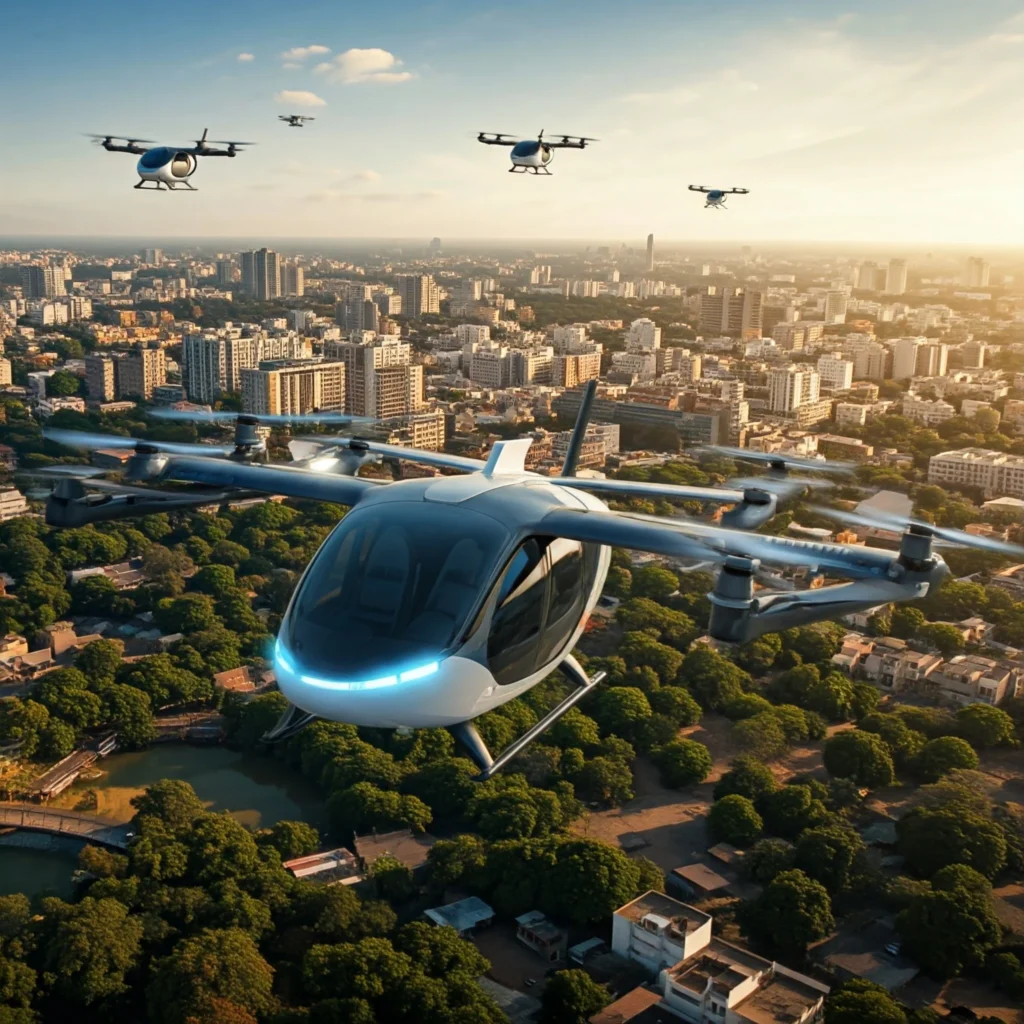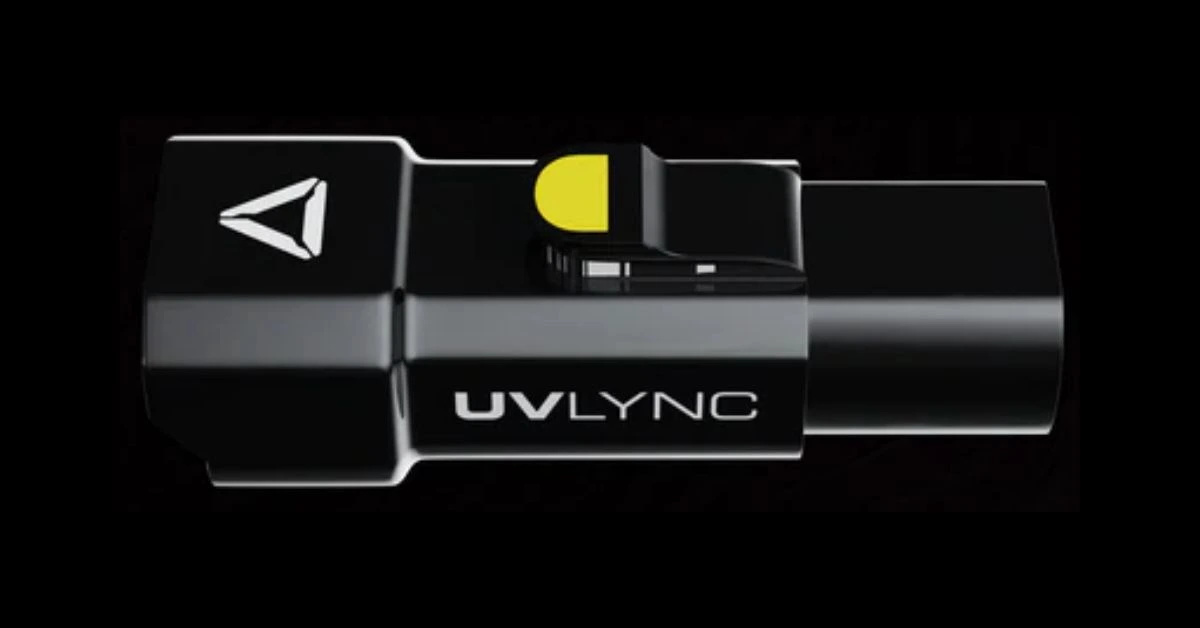Electric Flying Taxis in Bangalore: Let’s Enter into the Future
Bangalore, known for its bustling tech scene and notorious traffic jams, is on the brink of a transportation revolution. With the introduction of electric flying taxis, commuters will soon have a quick and eco-friendly option for traveling to and from the Kempegowda International Airport (KIA). This innovative venture, a partnership between Bangalore International Airport Limited (BIAL) and Sarla Aviation, promises to redefine urban mobility and make Bangalore’s traffic woes a thing of the past.
Table of Contents
The Vision of Electric Flying Taxis
Imagine zipping through the skies in just a matter of minutes. The electric flying taxi service in Bangalore aims to transform how residents commute to the airport, offering a swift alternative to the often prolonged journey on the ground. This partnership is part of a larger initiative focusing on sustainable air mobility solutions, with plans to launch electric vertical take-off and landing (eVTOL) aircraft.

Key Features of the Electric Flying Taxis
- Quick Travel Time: The proposed route from the airport to key city areas like Electronics City will take just 19 minutes by air, significantly less than the current road travel time of approximately 152 minutes.
- Affordable Pricing: The fare for this service is estimated to be around Rs 1,700, making it a cost-effective option compared to traditional helicopter services.
- Seven-Seater Capacity: Each eVTOL aircraft will accommodate seven passengers, including the pilot, providing a convenient option for families or small groups.
- Environmentally Friendly: These aircraft are designed to be quiet and powered entirely by electricity, reducing carbon emissions and contributing to a greener future for urban transport.
The Role of Sarla Aviation and BIAL
Sarla Aviation, co-founded by Adrian Schmidt, Rakesh Gaonkar, and Shivam Chauhan, is leading this initiative in Bangalore. With experience in western air traffic startups, the founders are well-positioned to drive innovation in this sector. Their partnership with BIAL is crucial for ensuring that the necessary infrastructure and regulatory framework are in place for the flying taxi service to operate effectively.
Technical Specifications
- Speed and Efficiency: The eVTOL aircraft can reach speeds of up to 250 km/h, making them ideal for quick inner-city travel.
- Charging and Range: These aircraft require only 15 minutes to charge between trips and can cover a range of up to 160 kilometers, though they are best suited for shorter urban routes of 20 to 40 kilometers.
- Safety Measures: The design emphasizes redundancy, with multiple backup systems in place to enhance safety. The electric propulsion system simplifies maintenance and boosts overall reliability.
On this partnership, Adrian Schmidt, co-founder and CEO of Sarla Aviation said
“We aim to redefine urban air transport with operational efficiency, reduced carbon emissions, and scalable infrastructure. Our electric flying taxis will set new benchmarks in reliability and performance, aligning with global standards for sustainable aviation”
Why Bangalore?
Bangalore, often referred to as the “Silicon Valley of India,” is renowned for its tech-savvy population and significant traffic congestion. This makes it the ideal candidate for implementing electric flying taxis. The city’s infrastructure challenges and the growing demand for quick transportation solutions create a perfect storm for innovative mobility options.
According to recent surveys, Bangalore ranks high on the list of cities with severe traffic congestion. During rush hour, it can take an average of 30 minutes to cover just 10 kilometers. The introduction of electric flying taxis aims to alleviate this problem by providing a fast and efficient alternative to road travel.
Benefits of Electric Flying Taxis
The introduction of electric flying taxis in Bangalore represents more than just a new mode of transport; it’s a step toward sustainable urban mobility. As air travel becomes an integral part of the city’s transportation network, the partnership aims to reduce carbon emissions while enhancing the efficiency of urban commutes.
- Time Efficiency: Reduce travel time significantly, making commutes quicker.
- Environmental Impact: Lower carbon footprint compared to traditional transport.
- Cost-Effectiveness: Estimated fare of around ₹1,700 per passenger, making it a competitive alternative to traditional helicopter services.
BIAL’s commitment to sustainability aligns perfectly with Sarla Aviation’s vision. The collaboration is set to introduce a cleaner, quieter alternative to road travel, which has become increasingly important in the face of urban congestion.
Challenges and Expectations
While the prospect of electric flying taxis in Bangalore is exciting, the project still faces several hurdles before becoming a reality. Regulatory approvals and the development of prototypes are critical steps that need to be addressed.
Challenges Ahead
- Regulatory Approval: Ensuring compliance with air traffic regulations is crucial for the project’s success.
- Prototype Development: Building and testing a working model of the eVTOL aircraft is necessary before commercial operations can begin.
- Public Acceptance: Gaining the trust of the public in using aerial taxis for everyday travel.
Expansion Plans
The partnership between BIAL and Sarla Aviation is not limited to Bangalore. The plan is to expand this service to other major Indian cities such as Mumbai, Delhi, and Pune, focusing on areas with heavy traffic. This broader vision could revolutionize urban transportation across the country.
Final Thoughts
The Electric Flying Taxi in Bangalore initiative represents a significant leap toward modern urban mobility. While the service may take two to three years to become fully operational, the groundwork is being laid for a transformative change in how we travel.
As Adrian Schmidt emphasized,
“The electric flying taxis will set a new benchmark in dependability and performance whilst aligning with global standards for sustainable aviation.” This ambitious project not only promises a faster, cleaner, and more efficient mode of transport but also paves the way for a greener future.
Read also: Royal Enfield Electric Bike: A New Era Begins on November 4, 2024
FAQs
1. What is the expected fare for the electric flying taxi service in Bangalore?
The fare is estimated to be around Rs 1,700 per passenger.
2. How long will the flight take from the city to the airport?
The flight is expected to take just 19 minutes.
3. When can we expect the electric flying taxis to start operations?
Full operations may take two to three years to begin, pending regulatory approvals.
4. What safety measures are in place for the flying taxis?
The aircraft is designed with multiple backup systems to enhance safety and reliability.
5. Which cities will the flying taxi service operate in besides Bangalore?
The service aims to expand to Mumbai, Delhi, and Pune, addressing congestion in these major cities.
6. How many passengers can the electric flying taxis accommodate?
Each aircraft will have a capacity of seven passengers, including the pilot.
7. What is the range of the electric flying taxis?
The electric flying taxis can cover a range of up to 160 kilometers but are optimized for inner-city travel of 20 to 40 kilometers.



